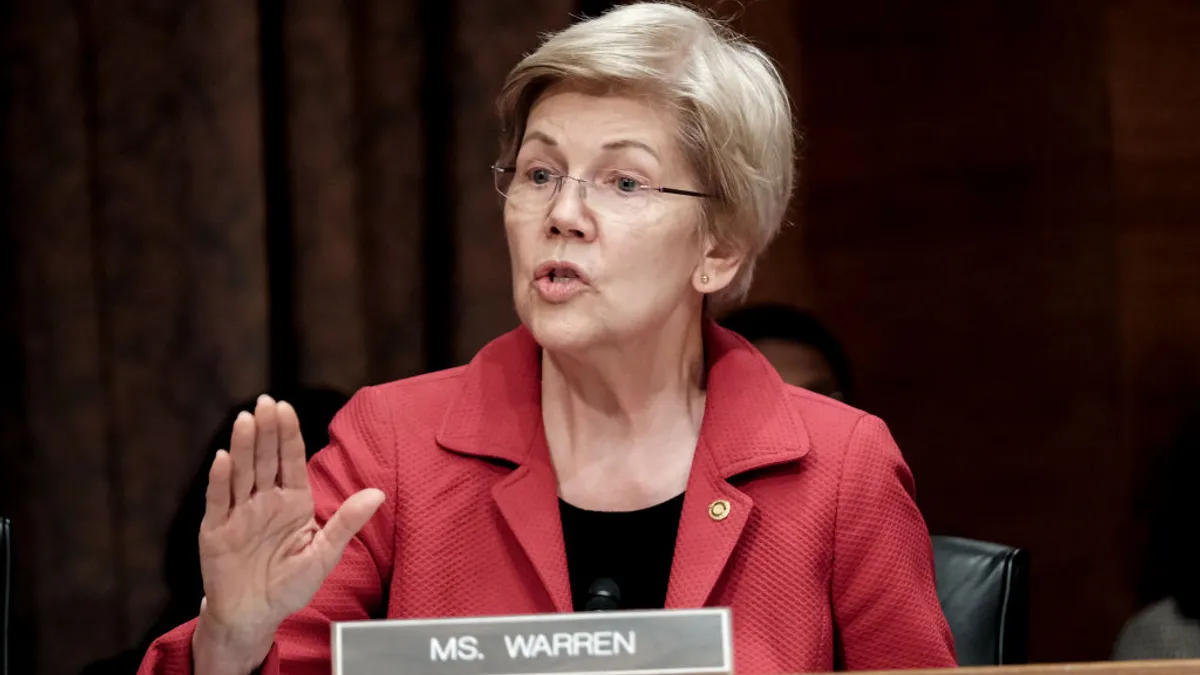Sen. Elizabeth Warren, D-MA, and three other Democratic senators warned Federal Deposit Insurance Corp. Acting Chair Travis Hill that the Department of Government Efficiency’s access to sensitive information and job cuts might hinder efforts to prevent future bank failures.
DOGE’s history of “indiscriminately dismantling critical government agencies” — a reference to a February incursion into the Consumer Financial Protection Bureau, combined with Trump administration efforts to cut its workforce by 90% — could lead to more bank failures, the senators said in a letter Thursday.
A Monday memo at the FDIC indicated the agency aimed to cut 1,250 jobs, or 20% of the regulator’s headcount.
Sens. Raphael Warnock of Georgia, Chris Van Hollen of Maryland and Lisa Blunt Rochester of Delaware, along with Warren, raised concerns that DOGE’s presence could threaten the $137 billion Deposit Insurance Fund, potentially undermining the FDIC's ability to manage deposit insurance and oversee orderly bank resolutions.
“Federal deposit insurance is a fundamental safeguard that underpins the public’s confidence in the U.S. banking system,” the lawmakers wrote. “Allowing the Elon Musk-led DOGE to degrade it in a moment of broader economic turmoil is deeply concerning.”
The FDIC, which oversees 4,500 financial institutions, is “severely understaffed” and cannot fulfill its statutory obligations, the lawmakers contended.
A review following Signature Bank's failure revealed that between 2020 and 2023, roughly 40% of large bank examiner positions were vacant or filled by temporary staff. The staffing shortage led to supervisory delays, postponed examinations and quality control issues in Signature Bank's supervision.
The FDIC's Office of Inspector General identified staffing weaknesses as a top management challenge for both 2024 and 2025. In response to a February inquiry about Trump administration executive orders on personnel and hiring, the OIG confirmed that filling “mission-critical positions” with skilled personnel remains “a major challenge” for the FDIC — even before DOGE began its work at the agency, the senators’ letter noted.
“Severely hollowing out the FDIC’s staff increases the likelihood of errors in the resolution process, which could have a detrimental impact on financial stability and public confidence in the banking system,” the .senators wrote.
The lawmakers argued that DOGE’s direct access to the FDIC’s confidential supervisory and investigative information is even more troubling, since DOGE has been accused of mishandling sensitive data in various cases. If DOGE receives access to the $137 billion DIF, it would raise questions about mismanagement or misappropriation of funds, lawmakers warned.
“No one nominated or confirmed DOGE employees or Elon Musk to run the FDIC, and nowhere in the statute does it permit you to cede your statutory authority to Elon Musk or representatives from the White House,” the senators wrote to Hill.
The senators raised a dozen questions, seeking clarification on DOGE’s involvement with the FDIC.
They requested Phase 1 and 2 plans related to the FDIC’s reduction in force and reorganization, and asked that Hill provide names of DOGE employees with access to any of the FDIC’s buildings or its information technology systems.
The senators requested a list of all data and systems to which DOGE staff have access, including confidential supervisory or investigative information. They questioned the scope and purpose of access to the systems that manage and maintain the DIF, as well as whether DOGE has access to them.
DOGE staff working at the FDIC were full-time employees who obtained the required clearances and worked with agency management under “formal interagency agreements,” the FDIC’s deputy to the chairman and chief operating officer said in an internal email seen by American Banker. The agency also said no sensitive bank information was shared or requested.
The senators requested a response from Hill by May 8.












